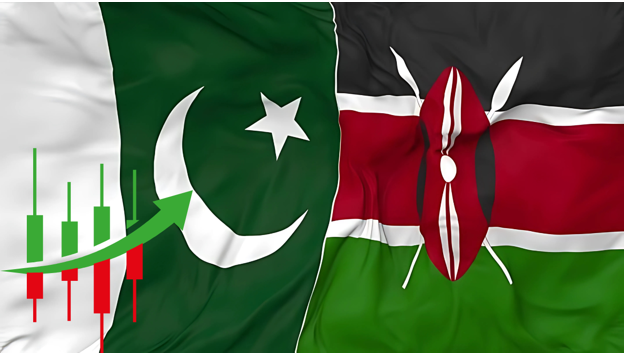آئی این پی ویلتھ پی کے
Muhammad Saleem
Tariff reforms can boost trade between Pakistan and Kenya. Rehan Naseem, President of the Faisalabad Chamber of Commerce and Industry (FCCI), said that pharmaceutical, chemicals, food processing, information technology and other sectors are growing by leaps and bounds in Faisalabad, catching the eye of the Kenyan High Commissioner to Pakistan Lt General Peter Mbogo Nijru. He said the High Commissioner visited FCCI a couple of days ago and had a productive meeting with the local business community.
He said Mr Nijru appreciated the “Look Africa” policy of the Government of Pakistan. Talking to businessmen, he said the High Commissioner urged the business community of Faisalabad to strike while the iron is hot by investing in Kenya and enhancing bilateral trade. He acknowledged that while textiles were the most globally recognized sector of Faisalabad, other industries in the district are now stepping into the spotlight with impressive momentum.
Highlighting opportunities in Kenya, he said that Pakistani entrepreneurs could invest in producing different commodities in addition to its processing, packaging and exports to African and other countries. He pointed out that products manufactured in Kenya enjoy duty-free access to many international markets, which gives investors a leg up. Likewise, Kenyan products are granted duty and quota-free entry into some European and American markets, the High Commissioner was quoted as saying by the FCCI president.
He said Pakistani investors could also explore this opportunity to expand their global reach. He stressed that to truly unlock this potential, both nations–Pakistan and Kenya–must negotiate trade agreements that can give bilateral trade a much-needed boost. The High Commissioner said that Kenya also offers golden opportunities for tourism development, with scenic valleys like Gilgit and Baltistan of Pakistan.
Rehan Naseem said that Pakistan imports huge quantities of tea and coffee from Kenya, urging its investors to put down roots in Pakistan by investing in the cultivation and processing of these products. He said that the Ministry of Commerce was in the middle of talks to secure market access for Pakistani exporters to eight African countries, including Kenya.
He pointed out that the Kenyan government needed to take a hard look at its tariff barriers– particularly on confectionary products– to clear the way for smoother trade relations with Pakistan. To build bridges between the two nations, he highlighted the importance of strengthening direct contacts between their business communities.
The banking sector is also throwing a wrench in the works as some Pakistani banks are reluctant to accept letters of credit issued by Kenyan banks, he said, urging authorities to nip the issue in the bud through immediate action. Muhammad Ali, a businessman, told WealthPk that although both countries have embassies and trade agreements, the actual trade volume remained quite low and needed improvement in the future.
A lack of awareness is preventing Pakistani businesses from investing in Kenya, as they are unfamiliar with market needs– and the same is true in reverse, he said. Besides, poor shipping routes are also another hurdle, as it takes time and money to move goods between ports, he added. “The governments of both countries should activate and support their private sectors so it can explore investment and trade opportunities.
Kenya imports a significant amount of machinery, textiles, and pharmaceuticals– and Pakistani entrepreneurs are well-positioned to supply these products,” he explained. “Without proper government support, trade between the two countries will continue to remain low,” he said.

Credit: INP-WealthPk











